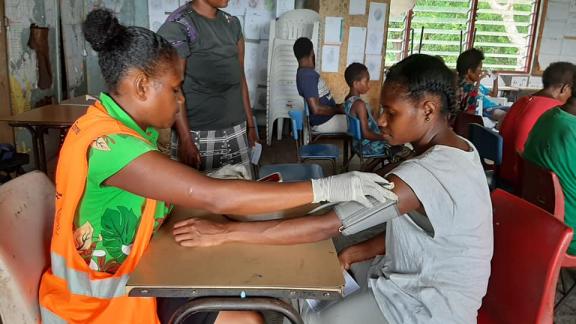There is no doubt that the climate crisis is one of the key challenges of our time – our planet is in a state of emergency and the time for action is now.
An often overlooked aspect of the climate crisis is how it intersects with sexual and reproductive health and rights (SRHR). The list of impacts of this intersection is devastatingly extensive, and includes:
- Reduced or unavailable services in areas affected by climate-related disasters, meaning access to services like contraception, safe abortion care, and STI testing and treatment is blocked
- Harmful effects on maternal health due to increased heat exposure
- Reduced access to safe water during pregnancy and childbirth
- An increase in sexual and gender‑based violence, and child, early and forced marriages during humanitarian crises or displacement
- Neglect of the health and rights needs of people who typically face marginalization, such as those with diverse sexual orientations, gender identities and expressions, and sex characteristics.
Underpinned by injustice
The climate crisis is underpinned by grave injustice. Those that contributed least to the problem are most severely affected by its impacts, while also having most limited access to resources to adapt.
As the climate crisis becomes more acute, the sexual and reproductive health and rights of millions of people in high-risk areas will continue to deteriorate. People with less power, resources or mobility will disproportionately bear the brunt of its harmful effects. Women and girls are at particular risk, with deeply ingrained, systemic discrimination meaning they are more likely to experience the harmful effects of the climate crisis.
With this in mind, sexual and reproductive health and rights are crucial for people’s resilience and capacity to adapt to the climate crisis. Healthy and empowered individuals who can exercise their rights are better able to cope with all forms of adversity.
What is IPPF doing about this?
IPPF works in many of the countries and regions most severely affected by the climate crisis and prone to disasters. Through both our healthcare service delivery and advocacy for sexual and reproductive health and rights, we support communities to adapt to the increasingly unstable environment.
In the past decade, we have significantly scaled up our humanitarian work. We are in countries before, during, and after a crisis, which allows us to protect the gains of our work and build resilience over the long term – as a result, in 2019 we served 4.6 million people in humanitarian settings.
We also prioritize reaching the most marginalized and under‑served communities, with a strong commitment to advancing gender equality. One such community that IPPF has been supporting recently is that on the Pacific island of Kiribati, where humanitarian crises are increasingly prevalent due to extreme weather events exacerbated by the climate crisis. In the face of tsunamis, earthquakes, flooding, droughts, and occasionally cyclones, our Member Association, the Kiribati Family Health Association, continues to engage in a range of vital activities, from carrying out sexual health screenings to running youth groups educating the next generation about SRHR.
Policy change is also a key element in the fight for climate justice. Our Member Associations drive policy change and champion the rights of marginalized and vulnerable groups at local and national levels. Additionally, as a globally connected Federation, we further work to effect policy change in support of sexual and reproductive health and rights and gender equality at regional and global levels.
when









